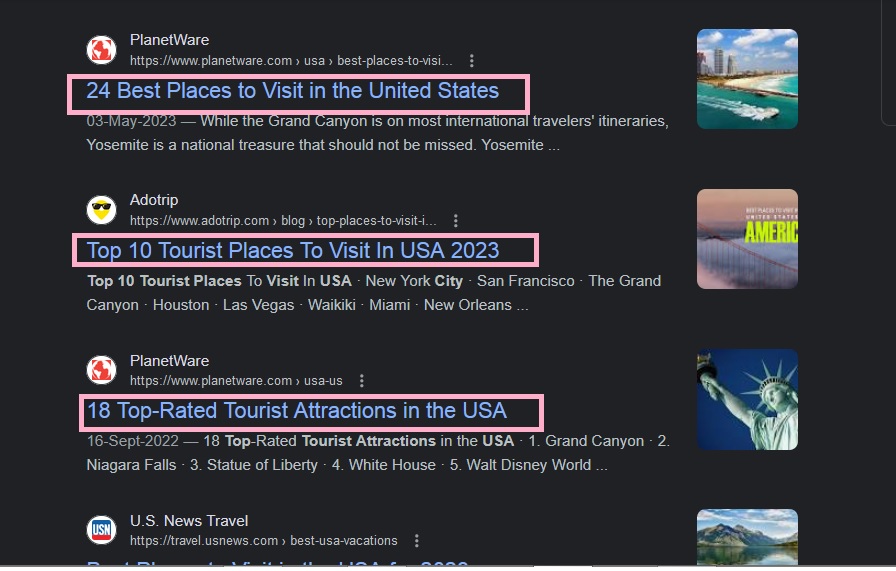Title tag and its importance in seo
Title tag in seo play a crucial role by helping search engines understand the content of your web pages and determining their relevance to search queries. These HTML elements not only impact your website’s visibility in search engine results but also significantly influence users’ decision to click on your link. In this detailed guide, we’ll explore the intricacies of title tags, their impact on SEO, and best practices to create effective title tags that drive organic traffic.In the ever-evolving landscape of search engine optimization (SEO), certain elements remain constant, and one of them is the significance of page titles. Often underestimated, page titles play a pivotal role in determining a webpage’s search engine visibility, user engagement, and overall success. In this comprehensive guide, we’ll delve into the intricacies of page titles and their profound impact on SEO, as well as explore strategies to create compelling and optimized titles that contribute to your website’s success.
What are Title Tags?
Title tags, also known as title elements, are HTML tags used to define the title of a web page. They appear as clickable headlines in search engine results pages (SERPs) and web browser tabs. The content within the title tags acts as a concise description of the page’s content and purpose. A well-crafted title tag gives users and search engines a clear understanding of what to expect on the page.Title tags are a confirmed ranking factor. Google uses your title tag to get an idea of what’s on your page and how relevant your content is to the user’s search query.Title tags also tell browsers how to display your page’s title in three key places: search results, browser tabs, and social media
What are Page Titles?
Page titles, also known as title tags or meta titles, are HTML elements that define the title of a webpage. They serve a dual purpose by being displayed in search engine results and web browser tabs. Each page on your website should have a unique page title, as it not only provides an overview of the content but also assists search engines in understanding the page’s topic and relevance.
HTML Structure of Title Tags
Title tags are enclosed within the <title> and </title> tags within the <head> section of an HTML document. This location in the HTML structure is crucial because it provides essential information to search engines before they begin parsing the page’s content. The text within the title tag is not visible on the page itself but plays a pivotal role in determining how the page appears in search results.
Title tag and its importance in seo
Title tags are one of the most critical on-page SEO elements. Search engines use title tags to understand the topic and relevance of a web page’s content. By optimizing title tags with relevant keywords, you can enhance your chances of ranking higher in search engine results. The keywords included in your title tags signal to search engines what your content is about, making it easier for them to match your page with relevant user queries.
Conduct Keyword Research
Because title tags are so important to search engines, you should complete your keyword research before crafting one. Once you complete keyword research, you should have a clear understanding of the content and be able to craft a keyword-rich title (without overusing keywords) that describes the content and entices searchers to choose your result.
Don’t Write A Title That Is Too Long
Title tags often get truncated in search results at around 550-600 pixel width, which is typically around 65 – 75 characters. So it is recommended to keep your title tag within that character limit to make your results more appealing to searchers.
Make Sure Every Page Has A Unique Title
Again, a title is a signal to searchers and search engines what a page is about. By creating unique content with unique titles you can help search engines avoid confusion and showing the wrong page.
Click-Through Rates (CTR)
While title tags influence search engine rankings, they also have a significant impact on click-through rates (CTR). When your title tag accurately represents the content and appeals to users’ intent, it encourages more clicks from search results to your website. Crafting compelling and informative title tags can differentiate your page from competitors and entice users to click, leading to increased organic traffic.
Keyword Research
Effective title tags start with thorough keyword research. Identify keywords and phrases that are relevant to your content and frequently searched by your target audience. Utilize keyword research tools to discover high-impact keywords with reasonable search volumes and low competition.
Keyword Placement and Variations
Place your primary keyword or key phrase near the beginning of the title tag. This helps search engines quickly identify the topic of your page. Additionally, consider incorporating variations of your target keyword to capture a broader range of search queries. However, avoid keyword stuffing—overloading the title tag with keywords— as it can lead to penalties from search engines.
Length and Clarity
While there is no strict character limit for title tags, it’s recommended to keep them between 50-60 characters to ensure they display fully in search results. Craft clear and concise title tags that accurately describe your content. A well-structured title tag provides users with a clear understanding of what the page offers, increasing the likelihood of clicks.
Unique Title Tags
Each page on your website should have a unique title tag. Duplicate title tags can confuse search engines and users, potentially leading to lower rankings and decreased organic traffic. Tailor each title tag to accurately reflect the content of the specific page it represents.
Branding in Title Tags
Consider incorporating your brand name in the title tag, especially if your brand is well-known or if the page serves a specific brand-related purpose. Balancing branding with relevant keywords can boost brand recognition while maintaining SEO optimization.
Avoiding Keyword Stuffing
While keywords are essential, overusing them in your title tags can have a detrimental impact on your SEO efforts. Aim for a natural and readable title tag that clearly communicates the content’s topic without feeling forced or spammy.
In the ever-evolving landscape of search engine optimization (SEO), certain elements remain constant, and one of them is the significance of page titles. Often underestimated, page titles play a pivotal role in determining a webpage’s search engine visibility, user engagement, and overall success. In this comprehensive guide, we’ll delve into the intricacies of page titles and their profound impact on SEO, as well as explore strategies to create compelling and optimized titles that contribute to your website’s success.

The SEO Power of Page Titles
Page titles hold a special place in the world of SEO. Search engines use them to determine what a webpage is about and whether it’s relevant to a user’s search query. An effectively optimized page title can significantly influence the search engine ranking of a webpage, making it a crucial factor in your overall SEO strategy. Additionally, page titles are the first impression users get of your content in search results, making them a critical aspect of user experience.
SEO Benefits of Optimized Page Titles
Improved Search Engine Rankings Optimizing your page titles can directly impact your search engine rankings. Search engines assess the relevance of your page to a particular query by analyzing the keywords present in your page title. Well-researched and strategically placed keywords in your page title can enhance your chances of ranking higher in search results, driving more organic traffic to your website.
Enhanced User Experience (UX) User experience is an essential element of SEO, and page titles play a role here too. A well-crafted page title not only informs users about the content but also entices them to click through to your page. When users find a title that matches their search intent, they are more likely to click, leading to higher click-through rates (CTR) and improved user engagement.
Crafting Effective Page Titles
Keyword Research for Page Titles Effective page titles start with thorough keyword research. Identify keywords that align with your content and are relevant to your target audience. Utilize keyword research tools to discover high-impact keywords with reasonable search volumes and competition levels.
Keyword Placement and Strategy Strategically place your primary keyword near the beginning of the page title. This helps search engines quickly identify the main topic of your page. Additionally, consider using long-tail keywords or variations of your main keyword to capture specific search queries and expand your reach.
Creating Compelling Page Titles An effective page title is not just about keywords; it’s also about engagement. Craft titles that pique users’ curiosity, convey value, or present a solution to their problem. Incorporate emotional triggers or actionable language to encourage clicks and convey the benefit users will receive from visiting your page.
Technical Considerations
Title Length and Best Practices While there’s no strict character limit for page titles, it’s best to keep them between 50-60 characters to ensure they display properly in search results. A concise and clear title is more likely to grab users’ attention and communicate the content effectively.
HTML Tags and Formatting Page titles are specified using the <title> tag in the HTML head section of your webpage. Proper HTML tag usage ensures that search engines recognize and display your title correctly. You can also enhance readability by using modifiers (such as “Best,” “Guide,” “Tips,” etc.) and separators (such as hyphens or pipes) to break up your title for better visual appeal.
Common Mistakes to Avoid
Keyword Stuffing and Over-Optimization
While incorporating keywords is crucial, over-optimizing your page title with too many keywords can lead to negative consequences. Keyword stuffing can harm user experience and even lead to search engine penalties. Strive for a natural and readable page title that accurately represents your content.
Irrelevant or Misleading Titles
Misleading titles can frustrate users and damage your website’s credibility. Ensure that your page title accurately reflects the content users will find on the page. Misaligned titles can lead to high bounce rates and decreased user trust.
Page Titles and Branding
Incorporating Branding in Page Titles
Branding is essential for recognition and trust. Including your brand name in the page title can increase brand visibility and user familiarity. However, it’s crucial to strike a balance between branding and keyword optimization to ensure that the title remains relevant to the content.
Consistency Across Pages
Maintaining consistency in your page title format across your website helps users navigate and understand your content better. Establishing a recognizable pattern can contribute to a more seamless user experience.
Page Titles and Mobile SEO
Mobile-Friendly Page Titles
With the increasing prevalence of mobile browsing, optimizing your page titles for mobile devices is crucial. Mobile users have limited screen space, so ensure that your titles are concise and still convey the essence of your content effectively.
Mobile Page Speed Impact
Page titles can indirectly impact mobile page loading speed. Excessively long titles can lead to truncation in search results, affecting user experience. By keeping titles concise, you contribute to faster page loading times on mobile devices.
Page titles are a cornerstone of effective SEO and user experience.
They are the gateway to your content in search results and play a pivotal role in determining whether users click through to your website. By understanding the intricacies of crafting optimized, engaging, and relevant page titles, you can enhance your website’s visibility, attract more organic traffic, and provide a positive user experience. As you implement the strategies outlined in this guide, you’ll be well on your way to achieving better rankings and establishing a strong online presence.
Crafting effective title tags is a fundamental aspect of SEO that directly influences your website’s visibility in search results and user engagement. By understanding the nuances of title tags and following best practices, you can create compelling, relevant, and optimized title tags that attract both search engine crawlers and human visitors. Mastering the art of title tag optimization will undoubtedly contribute to the overall success of your SEO strategy.






